商业特许经营管理办法(中英对照)
- 格式:doc
- 大小:84.50 KB
- 文档页数:32
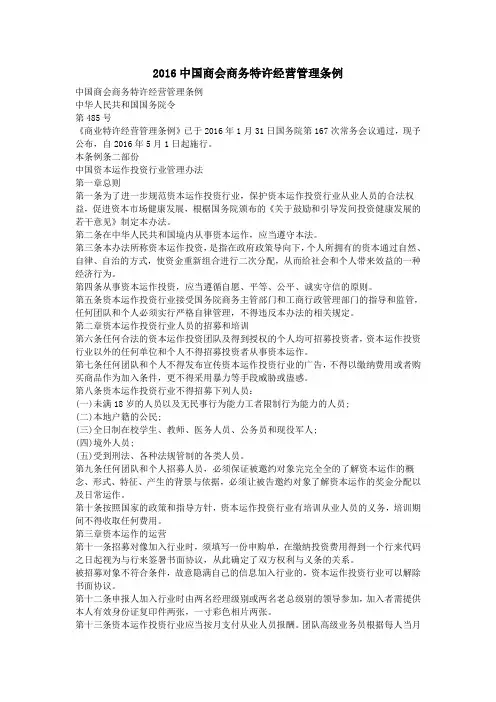
2016中国商会商务特许经营管理条例中国商会商务特许经营管理条例中华人民共和国国务院令第485号《商业特许经营管理条例》已于2016年1月31日国务院第167次常务会议通过,现予公布,自2016年5月1日起施行。
本条例条二部份中国资本运作投资行业管理办法第一章总则第一条为了进一步规范资本运作投资行业,保护资本运作投资行业从业人员的合法权益,促进资本市场健康发展,根椐国务院颁布的《关于鼓励和引导发间投资健康发展的若干意见》制定本办法。
第二条在中华人民共和国境内从事资本运作,应当遵守本法。
第三条本办法所称资本运作投资,是指在政府政策导向下,个人所拥有的资本通过自然、自律、自治的方式,使资金重新组合进行二次分配,从而给社会和个人带来效益的一种经济行为。
第四条从事资本运作投资,应当遵循自愿、平等、公平、诚实守信的原则。
第五条资本运作投资行业接受国务院商务主管部门和工商行政管理部门的指导和监管,任何团队和个人必须实行严格自律管理,不得违反本办法的相关规定。
第二章资本运作投资行业人员的招募和培训第六条任何合法的资本运作投资团队及得到授权的个人均可招募投资者,资本运作投资行业以外的任何单位和个人不得招募投资者从事资本运作。
第七条任何团队和个人不得发布宣传资本运作投资行业的广告,不得以缴纳费用或者购买商品作为加入条件,更不得采用暴力等手段威胁或蛊惑。
第八条资本运作投资行业不得招募下列人员:(一)未满18岁的人员以及无民事行为能力工者限制行为能力的人员;(二)本地户籍的公民;(三)全日制在校学生、教师、医务人员、公务员和现役军人;(四)境外人员;(五)受到刑法、各种法规管制的各类人员。
第九条任何团队和个人招募人员,必须保证被邀约对象完完全全的了解资本运作的概念、形式、特征、产生的背景与依据,必须让被告邀约对象了解资本运作的奖金分配以及日常运作。
第十条按照国家的政策和指导方针,资本运作投资行业有培训从业人员的义务,培训期间不得收取任何费用。
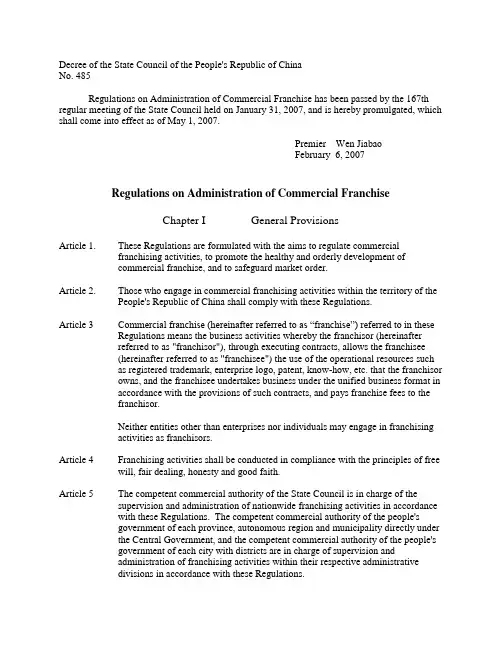
Decree of the State Council of the People's Republic of ChinaNo. 485Regulations on Administration of Commercial Franchise has been passed by the 167th regular meeting of the State Council held on January 31, 2007, and is hereby promulgated, which shall come into effect as of May 1, 2007.Premier Wen JiabaoFebruary 6, 2007Regulations on Administration of Commercial FranchiseChapter I General ProvisionsArticle 1. These Regulations are formulated with the aims to regulate commercialfranchising activities, to promote the healthy and orderly development ofcommercial franchise, and to safeguard market order.Article 2. Those who engage in commercial franchising activities within the territory of the People's Republic of China shall comply with these Regulations.Article 3 Commercial franchise (hereinafter referred to as “franchise”) referred to in these Regulations means the business activities whereby the franchisor (hereinafterreferred to as "franchisor"), through executing contracts, allows the franchisee(hereinafter referred to as "franchisee") the use of the operational resources suchas registered trademark, enterprise logo, patent, know-how, etc. that the franchisorowns, and the franchisee undertakes business under the unified business format inaccordance with the provisions of such contracts, and pays franchise fees to thefranchisor.Neither entities other than enterprises nor individuals may engage in franchisingactivities as franchisors.Article 4 Franchising activities shall be conducted in compliance with the principles of free will, fair dealing, honesty and good faith.Article 5 The competent commercial authority of the State Council is in charge of the supervision and administration of nationwide franchising activities in accordancewith these Regulations. The competent commercial authority of the people'sgovernment of each province, autonomous region and municipality directly underthe Central Government, and the competent commercial authority of the people'sgovernment of each city with districts are in charge of supervision andadministration of franchising activities within their respective administrativedivisions in accordance with these Regulations.Article 6 Any entity or individual shall have the right to report to the competentcommercial authority acts in violation of these Regulations. Upon receiving thereport, the competent commercial authority shall deal with such acts in a timelymanner in accordance with law.Chapter II Franchising ActivitiesArticle 7 A franchisor engaged in franchising activities shall own a well-developed business format and has the capabilities of to continuously provide operationalguidance, technical support, business training and other services to the franchisee.A franchisor engaged in franchising activities shall own at least two directly-operated outlets, and shall be in operation for more than one year.Article 8 Within fifteen days after the execution of the initial franchise contract, afranchisor shall file with the competent commercial authority for record inaccordance with the provisions of these Regulations. Where the franchisorengages in franchising activities within the territorial scope of a province,autonomous region or municipality directly under the Central Government, itshall file with the competent commercial authority of the people's government ofthe concerned province, autonomous region or municipality directly under theCentral Government where it is located; and where the franchisor engages infranchising activities across the territorial scope of a province, autonomous regionor municipality directly under the Central Government, it shall file with thecompetent commercial authority of the State Council for record.When filing with the competent commercial authority for record, a franchisorshall submit the following documents and materials:(1) A duplicate copy of its Business License or of its enterprise registration(filing) certificate;(2) A sample franchise contract;(3) Franchise operation manuals;(4) A marketing plan;(5) A written undertaking and relevant substantiating materials showing thatthe franchisor meets the requirements set forth in Article 7 hereof;(6) Other documents and materials as stipulated by the competent commercialauthority of the State Council.Where the products or services offered by the franchised business are subject toapproval as required by law, the franchisor shall also submit the relevant approvaldocuments.Article 9 Within ten days after the competent commercial authority has received the documents and materials submitted by the franchisor which comply with theprovisions in Article 8 of these Regulations, it shall make such filing for recordand notify the franchisor of such record. Where the documents and materialssubmitted by the franchisor are incomplete, the competent commercial authoritymay request the franchisor to submit supplementary documents and materialswithin seven days.Article 10 The competent commercial authority shall publish the name list of the franchisors already filed for record on the government website and keep it updated in a timelymanner.Article 11 A written franchise contract shall be entered into by the franchisor and the franchisee for engaging in franchising activities.A franchise contract shall include the following main contents:1) basic information of the franchisor and the franchisee;2) contents and duration of the franchise;3) types, amounts and payment methods of the franchise fees;4)specific contents and provision methods of the operational guidance,technical support, business training and other services;5) quality and standards requirements, as well as guarantee measures, for theproducts or services offered by the franchised business;6)promotion and advertisement of the products or services offered by thefranchised business;7) arrangements for protection of consumer rights/interests and undertakingof liability for compensation in the franchising activities;8) amendments, rescission and termination of the franchise contract;9) liability for breach of contract;10)methods of dispute resolution; and11)other matters as agreed upon by the franchisor and the franchisee.W ASH1\.3Article 12 The franchisor and the franchisee shall set forth in the franchise contract that the franchisee is entitled to unilaterally rescind the franchise contract within a certainperiod after the contract is signed.Article 13 The term of the franchise as stipulated in the franchise contract shall not be less than 3 years, unless otherwise agreed to by the franchisee.The provision in the preceding paragraph shall not apply when franchisor and franchisee extend the term of the franchise contract.Article 14 The franchisor shall provide the franchise operation manual to the franchisee, and continuously provide operational guidance, technical support, business trainingand other services to the franchisee according to the contents and methods asagreed upon.Article 15 The quality and standards of the products or services offered by the franchised business shall comply with the laws, administrative regulations and the provisionsof the relevant requirements of the State.Article 16 Where the franchisor requires the franchisee to pay fees before the franchise contract is signed, it shall explain in writing to the franchisee the purpose of suchfees and the conditions and manner for refund of the same.Article 17 The promotion and advertisement fees collected by the franchisor from the franchisee shall be used for the purposes as agreed upon in the contract. Thestatus pertaining to the use of the promotion and advertisement fees shall bedisclosed to the franchisee in a timely manner.The franchisor shall not conduct the advertisement and promotions in a fraudulentor misleading manner, and the advertisement published by it shall not containinformation publicizing the profits of the franchisees from their franchisingactivities.Article 18 Without the consent of the franchisor, the franchisee may not transfer its franchise to others.The franchisee may not divulge or permit others to use the trade secrets of thefranchisor of which it becomes aware.Article 19 In the first quarter of each year, the franchisor shall report to the competent commercial authority the situation of its franchise contract(s) signed during thepreceding year.Chapter III Information DisclosureArticle 20 The franchisor shall establish and implement a complete information disclosure system pursuant to the stipulations of the competent commercial authority of theState Council.Article 21 The franchisor shall provide the franchisee with the information as required in Article 22 hereof in writing, and the text of the franchise contract, at least 30 daysbefore the franchise contract is signed.Article 22 The franchisor shall disclose to the franchisee the following information:1)Franchisor's name, domicile, legal representative, registered capital,business scope, and the basic situations of its franchising activities;2)The basic situations of the franchisor's registered trademark, enterpriselogo, patent, know-how and business format;3)Types, amounts and payment methods of the franchise fees (includingwhether a deposit is required and the conditions and methods for itsrefund);4)Prices and conditions for the provision of products, services, or equipmentto the franchisee;5) Specific contents, provision methods and implementation plan in respectof the continuous provision of operational guidance, technical support,business training and other services to the franchisee;6) Specific measures in respect of the guidance and supervision over theoperational activities of the franchisee;7) Investment budget for the franchised business;8)The number, geographic distribution and evaluation of the operationalstatus of the existing franchisees in China;9) Summary of the financial accounting reports audited by an accountingfirm and summary of the audit reports both pertaining to the preceding twoyears;10) Situations of the litigations and arbitrations in connection with thefranchising activities in the latest five years;11) Existence or non-existence of material illegal operation track record of thefranchisor and its legal representative;W ASH1\.312) Other information as required by the competent commercial authority ofthe State Council.Article 23 The information provided by the franchisor to the franchisee shall be true, accurate and complete; and the franchisor shall not conceal the relevantinformation or provide any false information.Where any material changes occur with respect to information provided by thefranchisor to the franchisee, the franchisor shall inform the franchisee of the samein a timely manner.Where the franchisor concealed the relevant information or provided falseinformation, the franchisee may rescind the franchise contract.Chapter IV Legal LiabilitiesArticle 24 Where an franchisor does not satisfy the conditions set forth in the second paragraph of Article 7 of these Regulations but nonetheless engages in thefranchising activities, the competent commercial authority shall order a correctionto the violation, confiscate the illegal income and impose a fine of more thanRMB 100,000 yuan and less than RMB 500,000 yuan, and publicly announce thesame.Where an entity other than an enterprise, or an individual, engages in franchisingactivities in the capacity of a franchisor, the competent commercial authority shallorder cease and desist of the illegal business activities, confiscate the illegalincome, and impose a fine of more than RMB 100,000 yuan and less than RMB500,000 yuan.Article 25 Where a franchisor fails to file with the competent commercial authority for record in violation of the provisions in Article 8 of these Regulations but engagesin franchising activities, the competent commercial authority shall order a timelimit for rectification in terms of filing for record and may impose a fine of morethan RMB 10,000 yuan and less than RMB 50,000 yuan; and where the franchisorfails to file for record within such time limit, a fine of more than RMB 50,000yuan and less than RMB 100,000 yuan may be imposed and it shall be publiclyannounced.Article 26 Where a franchisor is in violation of the provisions in Articles 16 or 19 of these Regulations, the competent commercial authority shall order a correction to theviolation and may impose a fine of less than RMB 10,000 yuan; and where thefacts and circumstances of the concerned violation are serious, a fine of more thanRMB 10,000 yuan and less than RMB 50,000 yuan may be imposed and it may bepublicly announced.Article 27 Where a franchisor is in violation of the provisions in the second paragraph of Article 17 of these Regulations, the authority in charge of administration forindustry and commerce shall order a correction to the violation and may impose afine of more than RMB 30,000 yuan and less than RMB 100,000 yuan; where thefacts and circumstances of the concerned violation are serious, a fine of more thanRMB 100,000 yuan and less than RMB 300,000 yuan may be imposed and it maybe publicly announced, and it may be ordered to suspend the franchising activities;and where a criminal offense is constituted, the criminal liabilities shall beinvestigated according to law.The franchisor's fraudulent or misleading activities in advertising shall be handledand penalized pursuant to the relevant provisions of the advertisement laws. Article 28 Where a franchisor is in violation of the provisions in Articles 21 or 23 of these Regulations, and where the franchisee reports the violation to the competentcommercial authority and such report has been verified, the competentcommercial authority shall order a correction to the violation and may impose afine of more than RMB 10,000 yuan and less than RMB 50,000 yuan; and wherethe facts and circumstances of the concerned violation are serious, a fine of morethan RMB 50,000 yuan and less than RMB 100,000 yuan may be imposed and itmay be publicly announced.Article 29 Where money or property is defrauded in the name of franchising, if it constitutesa criminal offense, the criminal liabilities shall be investigated according to law;and where it does not constitute criminal offense, it shall be subject to thepunishment by the authority in charge of public security in accordance with theprovisions of the Law of the People’s Republic of China on Public SecurityAdministration Punishments.Where pyramid sales are engaged in the name of franchising, it shall be subject tothe punishment in accordance with the relevant provisions of the Regulations onProhibition of Pyramid Sales.Article 30 Where the personnel of the competent commercial authority abuse their power, neglect their duties, play favoritism and commit irregularities, if such constitutes acriminal offense, they shall be penalized according to the criminal law; wheresuch does not constitute a criminal offense, they shall be punished pursuant to therelevant law.Chapter V Supplementary ProvisionsArticle 31 Where franchising activities involve trademark license or patent license, they shall be administered in accordance with the relevant provisions of the laws andadministrative regulations in respect of trademark or patent.W ASH1\.3Article 32 The relevant associations and institutions shall formulate the code of conduct for franchising activities, strengthen the industrial self-discipline and provide therelated services to the parties involved in franchising activities under the guidanceof the competent commercial authority of the State Council in accordance withthe provisions of these Regulations.Article 33 The franchisors that have been engaging in franchising activities before these Regulations take effect shall file with the competent commercial authority forrecord in accordance with the provisions of these Regulations within one yearafter these Regulations take effect; and if they do not make such filing within suchtime limit, they shall be subject to penalization in accordance with the provisionsin Article 25 of these Regulations.The provisions in the second paragraph of Article 7 of these Regulations shall not apply to the franchisors mentioned in the preceding paragraph of this Article 33. Article 34 These Regulations shall take effect as of May 1, 2007.。
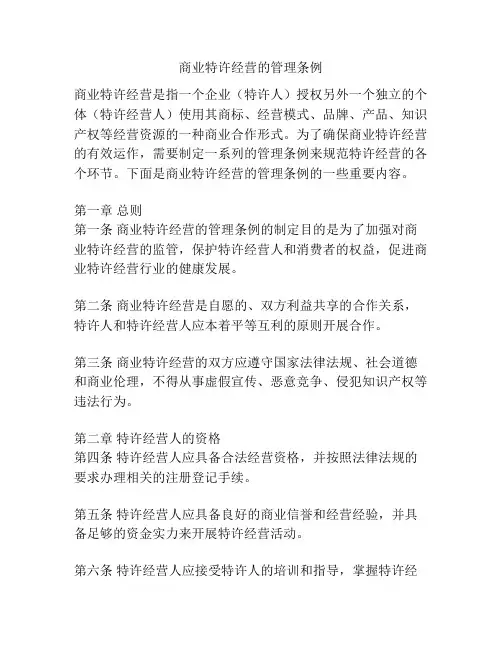
商业特许经营的管理条例商业特许经营是指一个企业(特许人)授权另外一个独立的个体(特许经营人)使用其商标、经营模式、品牌、产品、知识产权等经营资源的一种商业合作形式。
为了确保商业特许经营的有效运作,需要制定一系列的管理条例来规范特许经营的各个环节。
下面是商业特许经营的管理条例的一些重要内容。
第一章总则第一条商业特许经营的管理条例的制定目的是为了加强对商业特许经营的监管,保护特许经营人和消费者的权益,促进商业特许经营行业的健康发展。
第二条商业特许经营是自愿的、双方利益共享的合作关系,特许人和特许经营人应本着平等互利的原则开展合作。
第三条商业特许经营的双方应遵守国家法律法规、社会道德和商业伦理,不得从事虚假宣传、恶意竞争、侵犯知识产权等违法行为。
第二章特许经营人的资格第四条特许经营人应具备合法经营资格,并按照法律法规的要求办理相关的注册登记手续。
第五条特许经营人应具备良好的商业信誉和经营经验,并具备足够的资金实力来开展特许经营活动。
第六条特许经营人应接受特许人的培训和指导,掌握特许经营的核心技术和经营理念,确保特许经营活动的顺利进行。
第三章特许经营合同的签订第七条特许经营合同应采用书面形式,明确双方的权益和责任,并由特许经营人在合同签订前进行认真审查。
第八条特许经营合同应明确特许经营的范围、期限、地域、费用等具体内容,并约定双方违约责任和解决纠纷的方式。
第九条特许经营人在签订特许经营合同前,应充分了解特许人的商标、产品、服务、知识产权等经营资源,确保能够正确运用和维护。
第四章特许人的责任和义务第十条特许人应提供全面的培训和指导,确保特许经营人能够正确运作和管理特许经营项目。
第十一条特许人应定期进行考核和评估,及时发现问题并提供解决方案,确保特许经营的品质和效果。
第十二条特许人应提供良好的售后服务和技术支持,帮助特许经营人解决经营中遇到的问题和困难。
第五章特许经营人的责任和义务第十三条特许经营人应按照特许人的要求,遵循特许经营的经营模式、操作规程和标准,确保产品和服务的质量和安全。
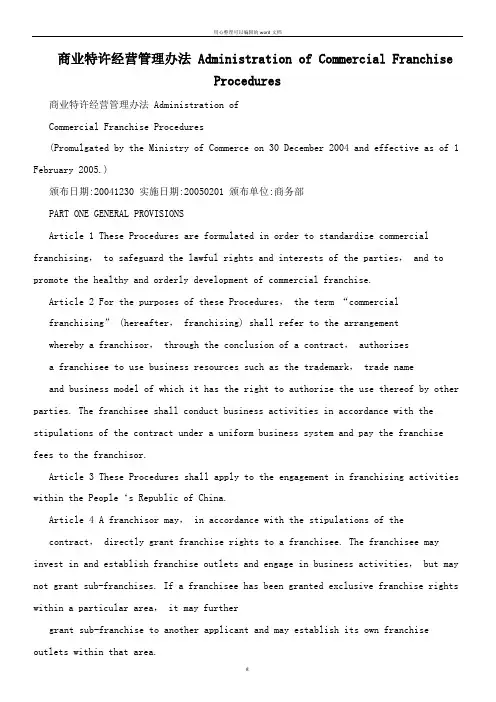
商业特许经营管理办法 Administration of Commercial FranchiseProcedures商业特许经营管理办法 Administration ofCommercial Franchise Procedures(Promulgated by the Ministry of Commerce on 30 December 2004 and effective as of 1 February 2005.)颁布日期:20041230 实施日期:20050201 颁布单位:商务部PART ONE GENERAL PROVISIONSArticle 1 These Procedures are formulated in order to standardize commercial franchising, to safeguard the lawful rights and interests of the parties, and to promote the healthy and orderly development of commercial franchise.Article 2 For the purposes of these Procedures,the term “commercialfranchising” (hereafter, franchising) shall refer to the arrangementwhereby a franchisor, through the conclusion of a contract, authorizesa franchisee to use business resources such as the trademark, trade nameand business model of which it has the right to authorize the use thereof by other parties. The franchisee shall conduct business activities in accordance with the stipulations of the contract under a uniform business system and pay the franchise fees to the franchisor.Article 3 These Procedures shall apply to the engagement in franchising activities within the People‘s Republic of China.Article 4 A franchisor may, in accordance with the stipulations of thecontract, directly grant franchise rights to a franchisee. The franchisee may invest in and establish franchise outlets and engage in business activities, but may not grant sub-franchises. If a franchisee has been granted exclusive franchise rights within a particular area, it may furthergrant sub-franchise to another applicant and may establish its own franchise outlets within that area.Article 5 The operation of franchise business shall abide by the laws and regulations of the People‘s Republic of China and t he principles of voluntariness, fairness, honesty and trustworthiness, and shall notharm the lawful rights and interests of consumers.A franchisor shall not use a franchise under false pretences to illegally engage in direct selling activities.A franchisor that engages in commercial activities in the form of franchising may not create market monopoly or obstruct fair competition.Article 6 The Ministry of Commerce shall implement regulation of franchising activities throughout China. Departments in charge of commerce at all levels shall implement regulation of franchising activities within their area of jurisdiction.PART TWO FRANCHISING PARTIESArticle 7 A franchisor shall have the following qualifications:1. it shall be an enterprise or other economic organization establishedaccording to law;2. it shall have the business resources such as trademark, trade nameand business model of which it has the right to authorize the use thereof by another party;3. it shall have the capability to provide long-term business guidance and training services to the franchisees;4. it shall have at least two directly-run stores within China that have been operated for at least one year, or directly run stores set up by its subsidiaries or companies in which it has a controlling share;5. where the franchisor is required to provide goods for franchising, itshall have a goods supply system that is stable and that can guarantee the quality, and shall be able to provide relevant services; and6. it shall have good reputation and no record of fraudulent activities in the form of franchising.Article 8 A franchisee shall have the following qualifications:1. it shall be an enterprise or other economic organization established according to law; and2. it shall have the funds, fixed premises and personnel, etc. thatcommensurate with franchising.Article 9 A franchisor shall enjoy the following rights:1. to supervise the business activities of the franchisee in accordance with the stipulations of the contract in order to ensure uniformity of the franchising system and the consistency of the quality of the products and services provided;2. to revoke the franchising qualifications in accordance with the stipulations of the contract of a franchisee that violates the franchise contract, infringes the lawful rights and interests of the franchisor, ordamages the franchising system;3. to collect franchise fees and deposits in accordance with the stipulations of the contract; and4. other rights stipulated in the contract.Article 10 A franchisor shall perform the following obligations:1. to disclose information according to the relevant provisions hereof in a timely manner;2. to grant the franchise rights for the use of the franchisee, and toprovide business symbols and operation manual that represent the franchising system;3. to provide to the franchisee sales, business or technical guidance,training and other services necessary for the operation of the franchise;4. to supply goods to the franchisee in accordance with the stipulations of the contract. Except in the case of exclusive commodities or goods that must be providedby the franchisor or a supplier designated by the franchisor to ensure the quality of franchising, the franchisor shall notcompel the franchisee to accept goods supplied by itself, but it maystipulate that the goods must reach the quality standard, or suggestseveral suppliers for the franchisee to select;5. the franchisor shall be responsible for guaranteeing the quality of goods supplied by the suppliers it designates;6. sales promotion and advertising stipulated in the contract; and7. other obligations stipulated in the contract.Article 11 A franchisee shall enjoy the following rights:1. business resources such as trademark, trade name and businessmodel the use of which are authorized by the franchisor;2. training and guidance provided by the franchisor;3. timely supply of goods provided or arranged by the franchisor at the price stipulated in the contract;4. sales promotion support uniformly provided by the franchisor; and5. other rights stipulated in the contract.Article 12 A franchisee shall perform the following obligations:1. to engage in business activities in accordance with the stipulations of the contract;2. to pay the franchise fees and the deposit;3. to safeguard the uniformity of the franchising system, and may notgrant sub-franchises without the permission of the franchisor;4. to provide to the franchisor in a timely manner true informationstipulated in the contract such as business conditions and financial status;5. to accept guidance and supervision of the franchisor;6. to maintain the confidentiality of the trade secrets of the franchisor;and7. other obligations stipulated in the contract.PART THREE FRANCHISE CONTRACTSArticle 13 The particulars of franchise contracts shall be agreed by theparties and shall in general include the following:1. the names and domiciles of the parties;2. the particulars, term and place of the grant of use of franchise rights, and whether or not it is exclusive;3. the type, amount and method of payment of franchise fees, andthe methods of collection and refund of deposit;4. confidentiality clauses;5. control of and responsibility for the quality of franchised goods andservices;6. training and guidance;7. use of trade name;8. use of intellectual property rights such as trademark;9. complaints of consumers;10. promotion and advertising;11. modification and termination of contract;12. liability for breach of contract;13. clauses on resolution ofdisputes; and14. other clauses agreed by both parties.Article 14 Franchise fees shall refer to the fees paid by the franchisee for obtaining the franchise rights, which shall include the following types:1. initial fee: a lump sum payment by the franchisee to the franchisor for franchise rights;2. usage fee: a fee paid periodically by the franchisee to the franchisor in the course of use of franchise rights according to a certain standard or ratio; and3. other stipulated fees: other fees paid by the franchisee to thefranchisor in accordance with the stipulations of the contract for relevant goods or services provided by the franchisor.Deposit shall refer to certain fees collected by the franchisor from the franchisee to ensure that the franchisee performs the franchise contract. The deposit shall be refunded to the franchisee upon expiration of the contract.Both parties to a franchise contract shall negotiate and determine franchise fees and deposit in accordance with the principles of fairnessand reasonableness.Article 15 The term of franchise contracts shall in general be no less than three years.Upon expiration of a franchise contract, the franchisor and thefranchisee may determine upon consultation the conditions for renewal of the franchise contract based on the principles of fairness and reasonableness.Article 16 After a franchise contract has terminated, the originalfranchisee may not continue to use the registered trademark, trade nameor other marks of the franchisor without the consent of the franchisor;apply to register the registered trademark of the franchisor as the trademark of commodities or services of similar上一篇英语: 商业银行市场风险管理指引 Market RiskManagement of Commercial Banks Guidelines下一篇英语: 国家税务总局关于特殊政策退税截至日期问题的批复 Reply of the StateAdministration of Taxation on the Issue concerning the Expiry Date for Special Policy Tax Refund查看更多关于法律英语的文章网友同时还浏览了:犯罪术语12犯罪术语11犯罪术语10犯罪术语9犯罪术语8犯罪术语7法律英语商业特许经营管理办法 Administration of CommercialFranchise Procedurestype; register an enterprise trade name withwordings that are identical or similar to the registered trademark of the franchisor; or use a mark identical or similar to the registered trademark, trade name or shop decoration of the franchisor for identical or similar commodities or services.PART FOUR INFORMATION DISCLOSUREArticle 17 The franchisor and franchisee shall disclose the relevant informationin a timely manner prior to the conclusion of the franchise contract and in the course of franchising.Article 18 The franchisor shall provide to the applicant true and accurate basic information related to franchising in writing and the text of the franchise contract 20 days prior to the formal conclusion of the contract.Article 19 The basic information to be disclosed by the franchisor shall include:1. the name, domicile, registered capital, scope of business and theterm of franchise of the franchisor, and basic details such as the contents of financial reports audited by an accounting firm and details of taxpayments;2. the number, location, business status and budget for investment in the franchise outlets of the franchisee, and the ratio of franchisees that have dissolved the franchise contract to the total number of franchisees;3. registration, use of licence and litigation concerning the trademark,and relevant details of other business resources such as the trade name and business model;4. type, amount and method of collection of franchise fees, andmethod of refund of deposit;5. details of any litigation in which it has been involved during the most recent five years;6. various goods supply or services that can be provided to the franchisee, as well as the supplementary conditions and restrictions,etc.;7. proof of ability to provide training and guidance to the franchisee,and the actual details of training or guidance provided;8. basic details of the legal representative and other principal responsible persons, and whether they have been subject to criminal penalty or have borne personal liability for bankruptcy of enterprise,etc.; and9. other information and details that the franchisee is required to disclose by the franchisor.If the information disclosed is incomplete or false, thereby causingeconomic loss to the franchisee, the franchisor shall bear the liability for compensation.Article 20 The franchisee shall truthfully provide information on its business capabilities in accordance with the requirements of the franchisor, including proof of principal qualification, creditworthiness,property rights, etc. In the course of franchising, it shall provide in a timely manner information stipulated in the contract such as the true details of the business status in accordance with the requirements of the franchisor.Article 21 In the course of franchising and after a franchise contract has terminated, the franchisee and its employees may not, without the consent of the franchisor, disclose, use or permit others to use the trade secrets of the franchisor that have come to their knowledge.Article 22 Persons and applicants that have not yet verified a franchise contract with the franchisor but have knowledge of the franchisor‘s t radesecrets through information disclosure of the franchisor shall be obliged to maintain confidentiality. Without the consent of the franchisor, they may not reveal, disclose or transfer the trade secrets of the franchisor to another party.PART FIVE ADVERTISING AND PROMOTIONArticle 23 The advertising and promotion information provided by franchisors during promotion, sales promotion or sale of franchise rights shall be accurate,truthful and lawful, and there may not be fabricationor omission of important facts, or statements that may possibly bemisleading.Article 24 Records and figures of business income and profits of the franchisor or other relevant information referred to directly or indirectly in the advertising and promotion materials of the franchisors and franchisees shall be true, and the area and time involved shall bespecified.Article 25 Franchisors and franchisees may not imitate the trademark,advertising scenes and terms, or other distinguishing marks of another party by any method that may be misleading, fraudulent or createconfusion.Article 26 In franchising promotion activities, a franchisor may notexaggerate the profits from franchising or deliberately conceal circumstances that may objectively affect the profits of others.PART SIX SUPERVISION AND ADMINISTRATIONArticle 27 Departments in charge of commerce at all levels shall strengthen administration and coordination of franchising activities within their administrative area, and shall guide the work of localindustry associations (or chambers of commerce)。
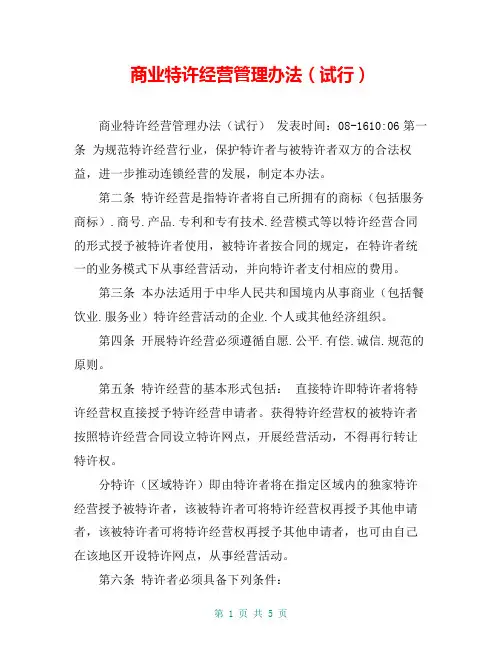
商业特许经营管理办法(试行)商业特许经营管理办法(试行)发表时间:08-1610:06第一条为规范特许经营行业,保护特许者与被特许者双方的合法权益,进一步推动连锁经营的发展,制定本办法。
第二条特许经营是指特许者将自己所拥有的商标(包括服务商标).商号.产品.专利和专有技术.经营模式等以特许经营合同的形式授予被特许者使用,被特许者按合同的规定,在特许者统一的业务模式下从事经营活动,并向特许者支付相应的费用。
第三条本办法适用于中华人民共和国境内从事商业(包括餐饮业.服务业)特许经营活动的企业.个人或其他经济组织。
第四条开展特许经营必须遵循自愿.公平.有偿.诚信.规范的原则。
第五条特许经营的基本形式包括:直接特许即特许者将特许经营权直接授予特许经营申请者。
获得特许经营权的被特许者按照特许经营合同设立特许网点,开展经营活动,不得再行转让特许权。
分特许(区域特许)即由特许者将在指定区域内的独家特许经营授予被特许者,该被特许者可将特许经营权再授予其他申请者,该被特许者可将特许经营权再授予其他申请者,也可由自己在该地区开设特许网点,从事经营活动。
第六条特许者必须具备下列条件:(一)具有独立法人的资格;(二)具有注册商标.商号.产品.专利品和独特的.可传授的经营管理技术或诀窍,并有一年以上良好的经营业绩;(三)具有一定的经营资源;(四)具备向被特许者提供长期经营指导和服务的能力。
第七条被特许者必须具备下列条件:(一)具有合法资格的法人或自然人;(二)拥有必要的经营资源(资金.场地.人才等);(三)具有一定的经营管理能力。
第八条特许者的基本权利是:(一)为确保特许体系的统一性和产品.服务质量的一致性,特许者有权对被特许者的经营活动进行监督;(二)有权向被特许者收取特许经营权费及各种服务费用;(三)对违反特许经营合同规定,侵犯特许者合法权益,破坏特许体系的行为,特许者有权终止被特许者的特许经营资格。
第九条特许者的义务是:(一)将特许经营权授予被特许者使用并提供代表该特许体系的营业象征及经营手册;(二)提供开业前的教育和培训;(三)指导被特许者做好开店准备;(四)提供长期的经营指导.培训和合同规定的物品规定。

商业特许经营管理办法商业特许经营管理办法是指对特许经营的商业行为进行规范和管理的法律文件。
本文将从特许经营的定义、特许经营的优势和挑战、商业特许经营管理办法的内容等方面进行阐述。
一、特许经营的定义特许经营是指特许人将其商业经营方式、品牌、知识产权、技术及经验等授权给他人,由被授权方支付特许费并按照特许人的经营模式进行经营的一种商业合作模式。
特许经营可以在国内、国际范围内开展。
二、特许经营的优势和挑战特许经营的优势主要体现在以下几个方面:1. 利用特许人的品牌和知识产权可以快速进入市场,降低市场开拓风险;2. 通过特许人的经验和经营模式,减少经营者的经验积累和学习成本;3. 特许经营可以获得连锁效应,扩大市场份额;4. 特许经营可以在一定程度上实现资源共享,降低成本;5. 特许经营可以建立起品牌忠诚度,提高市场竞争力。
然而,特许经营也存在一些挑战:1. 需要支付特许费,并按照特许人的规定经营,降低了经营者的自主权;2. 特许经营需要严格遵守特许人的经营标准和规范,给经营者带来了一定的约束;3. 特许经营需要与特许人保持良好合作关系,依赖性较强;4. 特许经营需要消耗一定的时间和人力资源,需要投入大量的精力进行管理。
三、商业特许经营管理办法的内容商业特许经营管理办法主要包括以下几个方面的内容:1. 特许经营合同的签订:明确特许人和被授权方的权利和义务,规范特许经营的经营方式和范围,确保特许经营活动的顺利进行;2. 特许经营费用的支付:明确特许经营费用的金额、支付方式和支付期限,保证特许人的合法权益;3. 特许经营的监督管理:特许经营管理办法规定对特许经营活动进行监督和管理,保证特许经营者依照特许人的要求进行经营;4. 重要信息的保密和商业秘密的保护:商业特许经营管理办法要求特许经营者对特许人的商业信息和商业秘密进行保密,并防止盗用和泄露;5. 特许经营终止和争议解决:商业特许经营管理办法规定特许经营合同的终止流程和程序,并明确特许经营合同争议的解决方式。
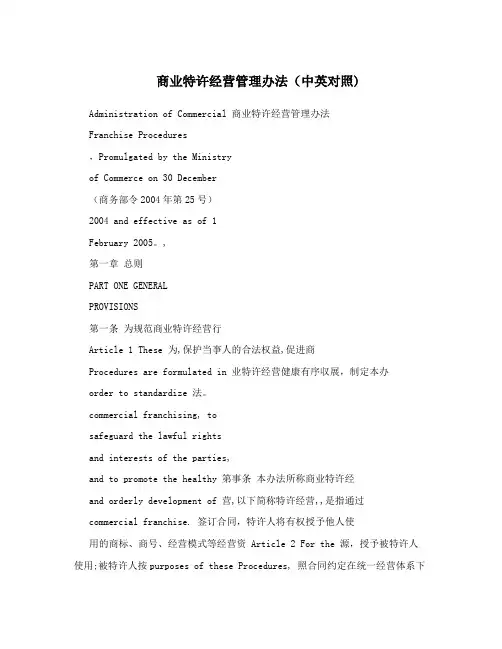
商业特许经营管理办法(中英对照) Administration of Commercial 商业特许经营管理办法Franchise Procedures,Promulgated by the Ministryof Commerce on 30 December(商务部令2004年第25号)2004 and effective as of 1February 2005。
,第一章总则PART ONE GENERALPROVISIONS第一条为规范商业特许经营行Article 1 These 为,保护当亊人的合法权益,促进商Procedures are formulated in 业特许经营健康有序収展,制定本办order to standardize 法。
commercial franchising, tosafeguard the lawful rightsand interests of the parties,and to promote the healthy 第事条本办法所称商业特许经and orderly development of 营,以下简称特许经营,,是指通过commercial franchise. 签订合同,特许人将有权授予他人使用的商标、商号、经营模式等经营资 Article 2 For the 源,授予被特许人使用;被特许人按purposes of these Procedures, 照合同约定在统一经营体系下从亊the term “commercial 经营活劢,幵向特许人支付特许经营franchising” ,hereafter,费。
franchising, shall refer to thearrangement whereby afranchisor, through theconclusion of a contract,authorizes a franchisee to usebusiness resources such as thetrademark, trade name andbusiness model of which it has第三条在中华人民共和国境内the right to authorize the use 开展特许经营活劢适用本办法。
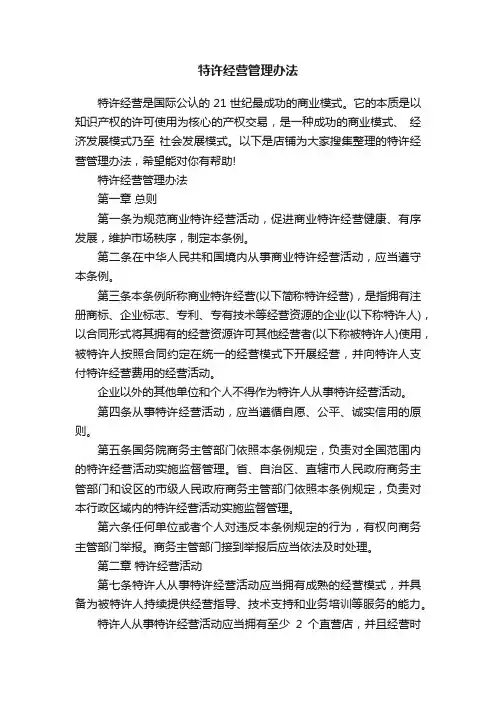
特许经营管理办法特许经营是国际公认的21世纪最成功的商业模式。
它的本质是以知识产权的许可使用为核心的产权交易,是一种成功的商业模式、经济发展模式乃至社会发展模式。
以下是店铺为大家搜集整理的特许经营管理办法,希望能对你有帮助!特许经营管理办法第一章总则第一条为规范商业特许经营活动,促进商业特许经营健康、有序发展,维护市场秩序,制定本条例。
第二条在中华人民共和国境内从事商业特许经营活动,应当遵守本条例。
第三条本条例所称商业特许经营(以下简称特许经营),是指拥有注册商标、企业标志、专利、专有技术等经营资源的企业(以下称特许人),以合同形式将其拥有的经营资源许可其他经营者(以下称被特许人)使用,被特许人按照合同约定在统一的经营模式下开展经营,并向特许人支付特许经营费用的经营活动。
企业以外的其他单位和个人不得作为特许人从事特许经营活动。
第四条从事特许经营活动,应当遵循自愿、公平、诚实信用的原则。
第五条国务院商务主管部门依照本条例规定,负责对全国范围内的特许经营活动实施监督管理。
省、自治区、直辖市人民政府商务主管部门和设区的市级人民政府商务主管部门依照本条例规定,负责对本行政区域内的特许经营活动实施监督管理。
第六条任何单位或者个人对违反本条例规定的行为,有权向商务主管部门举报。
商务主管部门接到举报后应当依法及时处理。
第二章特许经营活动第七条特许人从事特许经营活动应当拥有成熟的经营模式,并具备为被特许人持续提供经营指导、技术支持和业务培训等服务的能力。
特许人从事特许经营活动应当拥有至少2个直营店,并且经营时间超过1年。
第八条特许人应当自首次订立特许经营合同之日起15日内,依照本条例的规定向商务主管部门备案。
在省、自治区、直辖市范围内从事特许经营活动的,应当向所在地省、自治区、直辖市人民政府商务主管部门备案;跨省、自治区、直辖市范围从事特许经营活动的,应当向国务院商务主管部门备案。
特许人向商务主管部门备案,应当提交下列文件、资料:(一)营业执照复印件或者企业登记(注册)证书复印件;(二)特许经营合同样本;(三)特许经营操作手册;(四)市场计划书;(五)表明其符合本条例第七条规定的书面承诺及相关证明材料;(六)国务院商务主管部门规定的其他文件、资料。
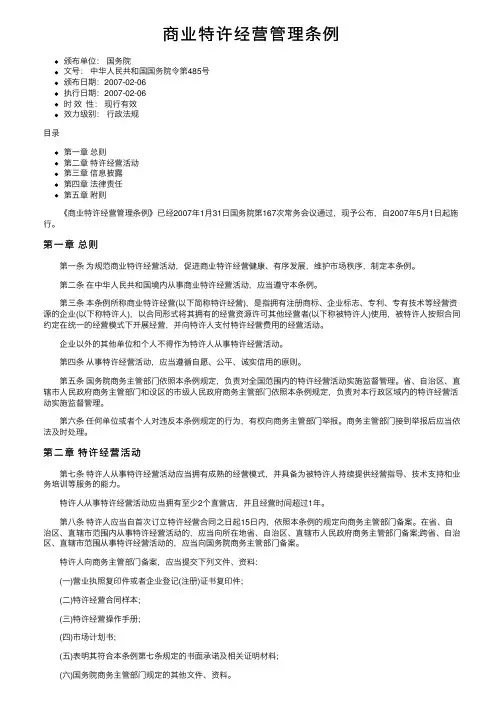
商业特许经营管理条例颁布单位:国务院⽂号:中华⼈民共和国国务院令第485号颁布⽇期:2007-02-06执⾏⽇期:2007-02-06时效性:现⾏有效效⼒级别:⾏政法规⽬录第⼀章总则第⼆章特许经营活动第三章信息披露第四章法律责任第五章附则《商业特许经营管理条例》已经2007年1⽉31⽇国务院第167次常务会议通过,现予公布,⾃2007年5⽉1⽇起施⾏。
第⼀章总则第⼀条为规范商业特许经营活动,促进商业特许经营健康、有序发展,维护市场秩序,制定本条例。
第⼆条在中华⼈民共和国境内从事商业特许经营活动,应当遵守本条例。
第三条本条例所称商业特许经营(以下简称特许经营),是指拥有注册商标、企业标志、专利、专有技术等经营资源的企业(以下称特许⼈),以合同形式将其拥有的经营资源许可其他经营者(以下称被特许⼈)使⽤,被特许⼈按照合同约定在统⼀的经营模式下开展经营,并向特许⼈⽀付特许经营费⽤的经营活动。
企业以外的其他单位和个⼈不得作为特许⼈从事特许经营活动。
第四条从事特许经营活动,应当遵循⾃愿、公平、诚实信⽤的原则。
第五条国务院商务主管部门依照本条例规定,负责对全国范围内的特许经营活动实施监督管理。
省、⾃治区、直辖市⼈民政府商务主管部门和设区的市级⼈民政府商务主管部门依照本条例规定,负责对本⾏政区域内的特许经营活动实施监督管理。
第六条任何单位或者个⼈对违反本条例规定的⾏为,有权向商务主管部门举报。
商务主管部门接到举报后应当依法及时处理。
第⼆章特许经营活动第七条特许⼈从事特许经营活动应当拥有成熟的经营模式,并具备为被特许⼈持续提供经营指导、技术⽀持和业务培训等服务的能⼒。
特许⼈从事特许经营活动应当拥有⾄少2个直营店,并且经营时间超过1年。
第⼋条特许⼈应当⾃⾸次订⽴特许经营合同之⽇起15⽇内,依照本条例的规定向商务主管部门备案。
在省、⾃治区、直辖市范围内从事特许经营活动的,应当向所在地省、⾃治区、直辖市⼈民政府商务主管部门备案;跨省、⾃治区、直辖市范围从事特许经营活动的,应当向国务院商务主管部门备案。
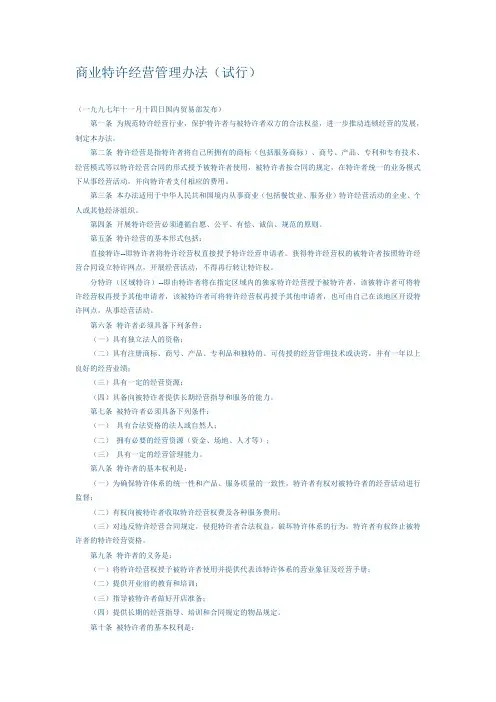
商业特许经营管理办法(试行)(一九九七年十一月十四日国内贸易部发布)第一条为规范特许经营行业,保护特许者与被特许者双方的合法权益,进一步推动连锁经营的发展,制定本办法。
第二条特许经营是指特许者将自己所拥有的商标(包括服务商标)、商号、产品、专利和专有技术、经营模式等以特许经营合同的形式授予被特许者使用,被特许者按合同的规定,在特许者统一的业务模式下从事经营活动,并向特许者支付相应的费用。
第三条本办法适用于中华人民共和国境内从事商业(包括餐饮业、服务业)特许经营活动的企业、个人或其他经济组织。
第四条开展特许经营必须遵循自愿、公平、有偿、诚信、规范的原则。
第五条特许经营的基本形式包括:直接特许--即特许者将特许经营权直接授予特许经营申请者。
获得特许经营权的被特许者按照特许经营合同设立特许网点,开展经营活动,不得再行转让特许权。
分特许(区域特许)--即由特许者将在指定区域内的独家特许经营授予被特许者,该被特许者可将特许经营权再授予其他申请者,该被特许者可将特许经营权再授予其他申请者,也可由自己在该地区开设特许网点,从事经营活动。
第六条特许者必须具备下列条件:(一)具有独立法人的资格;(二)具有注册商标、商号、产品、专利品和独特的、可传授的经营管理技术或诀窍,并有一年以上良好的经营业绩;(三)具有一定的经营资源;(四)具备向被特许者提供长期经营指导和服务的能力。
第七条被特许者必须具备下列条件:(一)具有合法资格的法人或自然人;(二)拥有必要的经营资源(资金、场地、人才等);(三)具有一定的经营管理能力。
第八条特许者的基本权利是:(一)为确保特许体系的统一性和产品、服务质量的一致性,特许者有权对被特许者的经营活动进行监督;(二)有权向被特许者收取特许经营权费及各种服务费用;(三)对违反特许经营合同规定,侵犯特许者合法权益,破坏特许体系的行为,特许者有权终止被特许者的特许经营资格。
第九条特许者的义务是:(一)将特许经营权授予被特许者使用并提供代表该特许体系的营业象征及经营手册;(二)提供开业前的教育和培训;(三)指导被特许者做好开店准备;(四)提供长期的经营指导、培训和合同规定的物品规定。
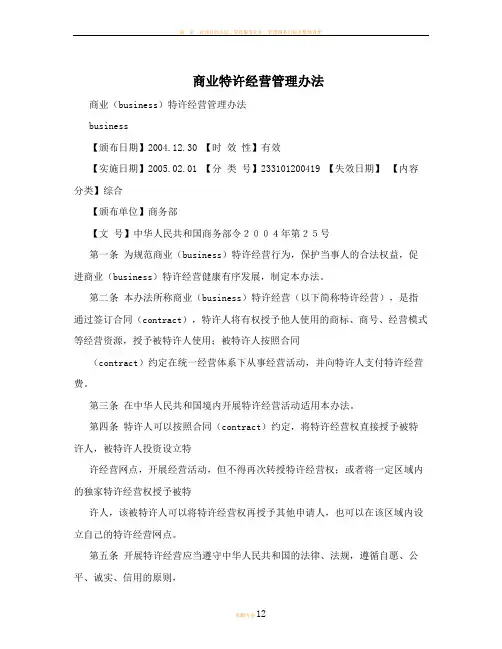
商业特许经营管理办法商业(business)特许经营管理办法business【颁布日期】2004.12.30 【时效性】有效【实施日期】2005.02.01 【分类号】233101200419 【失效日期】【内容分类】综合【颁布单位】商务部【文号】中华人民共和国商务部令2004年第25号第一条为规范商业(business)特许经营行为,保护当事人的合法权益,促进商业(business)特许经营健康有序发展,制定本办法。
第二条本办法所称商业(business)特许经营(以下简称特许经营),是指通过签订合同(contract),特许人将有权授予他人使用的商标、商号、经营模式等经营资源,授予被特许人使用;被特许人按照合同(contract)约定在统一经营体系下从事经营活动,并向特许人支付特许经营费。
第三条在中华人民共和国境内开展特许经营活动适用本办法。
第四条特许人可以按照合同(contract)约定,将特许经营权直接授予被特许人,被特许人投资设立特许经营网点,开展经营活动,但不得再次转授特许经营权;或者将一定区域内的独家特许经营权授予被特许人,该被特许人可以将特许经营权再授予其他申请人,也可以在该区域内设立自己的特许经营网点。
第五条开展特许经营应当遵守中华人民共和国的法律、法规,遵循自愿、公平、诚实、信用的原则,不得损害消费者合法权益。
特许人不得假借特许经营的名义,非法从事传销活动。
特许人以特许经营方式从事商业(business)活动不得导致市场垄断、妨碍公平竞争。
第六条商务部对全国特许经营活动实施监督管理,各级商务主管部门对辖区内的特许经营活动实施监督管理。
第七条特许人应当具备下列条件:(一)依法设立的企业或者其他经济组织;(二)拥有有权许可他人使用的商标、商号和经营模式等经营资源;(三)具备向被特许人提供长期经营指导和培训服务的能力;(四)在中国境内拥有至少两家经营一年以上的直营店或者由其子公司、控股公司建立的直营店;(五)需特许人提供货物供应的特许经营,特许人应当具有稳定的、能够保证品质的货物供应系统,并能提供相关的服务。
Les bases du commerce en franchiseLorsque vous envisagez de monter votre entreprise, vous avez le choix entre la création complète d’une société, le rachat d’une entreprise existante ou la mise en place d’une franchise. Avoir une franchise etl’exploiter peut représenter autant de travail que les autres solutions et peut aussi générer des bénéfices relativement importants.Il existe des milliers d’entreprises franchisées pratiquement dans tous les secteurs imaginables, de la grande marque nationale à la petite opportunité locale. Le plus difficile est de trouver un type de franchise susceptible de vous plaire et de générer des bénéfices. De nombreux spécialistes du commerce en franchise recommandent de comparer les conditions de plusieurs franchises avant de décider laquelle vous convient. Utilisez les réponses à ces questions pour vous aider à approfondir le sujet.∙Qu'est-ce qu'une franchise ? Comment cela fonctionne-t-il ?∙Quels sont les avantages de la franchise par rapport à la création d’entreprise complète ?∙Il y a-t-il un inconvénient à être franchisé ?∙Quelles lois sur les franchises commerciales dois-je connaître ?∙À quels éléments importants dois-je faire attention dans les documents d’information ?∙Quels sont les éléments importants lors du choix d’une franchise ?∙Puis-je faire des recherches supplémentaires pour en savoir plus sur une franchise particulière ?∙Quels sont les frais que je dois m’attendre à payer pour ma franchise ?∙Dois-je préférer une franchise bien établie sur le marché ou une nouvelle franchise prometteuse ? Qu’est-ce qu’une franchise ? Comment cela fonctionne-t-il ?Lorsque vous achetez une franchise, vous achetez le droit d’utiliser une marque ou un concept commercial déterminé. L’entreprise que vous exploitez est foncièrement la même que toute autre entreprise exploitée sous le même nom. Dans cette optique, il se peut que vous soyez amené à acheter des produits, des outils, de l’aide publicitaire et des formations au franchiseur (la société qui détient les droits de l’entreprise). Puisque l’entreprise vous appartient, cette opération est régie par les termes d’un co ntrat de franchise. Pour beaucoup, il s’agit de l’avantage principal de la franchise : vous bénéficiez de l’image commerciale, de la marque et du réseau d’assistance fournis par le franchiseur. On dit souvent que la franchise permet de se lancer dans les affaires pour soi-même et non par soi-même.Quels sont les avantages de la franchise par rapport à la création d’entreprise complète ?La franchise vous procure un certain nombre d’avantages :∙La réduction des risques : le taux de faillite des franchises est généralement moindre que celui des autres entreprises. Pourquoi ? Parce que vous achetez un concept commercial dont la plupart des problèmes ont été envisagés par quelqu’un d’autre.∙Vous di sposez d’une offre complète : tous les imprévus qui surgissent habituellement quand on se met à son compte ont été pensés. L’offre peut inclure les marques, l’accès facile à un produit bien établi sur le marché, une méthode de marketing qui a fait ses preuves, du matériel, un stock, etc.∙L’union fait la force : lorsque vous devenez franchisé, vous bénéficiez du pouvoir d’achat de l’ensemble du réseau, ce qui peut vous aider à obtenir un produit et à concurrencer des chaînesplus importantes sur le plan national.∙Procédés commerciaux : de nombreux franchiseurs fournissent à leurs franchisés plusieurs systèmes qui ont fait leurs preuves par exemple des systèmes comptables ou financiers, formationet assistance continue, recherche et développement, aide à la vente et au marketing, planification et prévisions, gestion du stock, etc. Ils vous enseigneront les techniques qui ont contribué à laréussite de l’entreprise et vous aideront à les utiliser pour développer votre société.∙Assistance financière et aide au choix de l’implantation : certaines sociétés vous aideront à financer votre franchise, contribuant ainsi à votre réussite sans vous obliger à apporter un capital important.Une aide au choix du lieu d’implantation peut aussi être disponible, ce qui permet de garantir que l’implantation de votre entreprise va être favorable à son développement.∙Publicité et promotion : vous allez non seulement bénéficier des campagnes nationales ou régionales du franchiseur mais il se peut aussi que des aides supplémentaires soient fournies. Ilpeut aussi bien s’agir de modèles publicitaires prêts à imprimer que de PLV destinée à guider vos clients. Le coût d’élaboration de tels supports serait très élevé si vous deviez l’assumer vous-même.Il y a-t-il un inconvénient à être franchisé ?La franchise n’est pas pour tout le monde. Voici certains des désavantages potentiels :∙Manque de contrôle : le principe de la franchise (l’achat et l’exploitation d’un concept commercial qui a fait ses preuves) peut plus vous donner l’impression d’être employé que patron. Cela peutêtre gênant pour certains, notamment pour ceux qui ont l’esprit d’entreprise et qui peuventtrouver difficile de se conformer à un système qui n’est pas le leur.∙Coût : l’ouverture et l’exploitation d’une fran chise peuvent coûter relativement cher. Au départ, les dépenses peuvent être élevées et les redevances régulières peuvent avoir un impact important sur votre flux de trésorerie.∙Vous n’êtes pas seul : la réputation du franchiseur peut à elle seule bénéfic ier à votre entreprise de même que les problèmes du franchiseur sont les vôtres. C’est-à-dire que si la société mère traverse une période difficile, votre franchise peut en souffrir en raison de la proximité des liens entre lesdeux entreprises.∙Engagement : votre contrat de franchise est un engagement qui vous lie et qui peut être relativement restrictif. Vous êtes obligé d’observer certaines pratiques commerciales, de régler des redevances et vous n’avez pas non plus la liberté de choisir l’image de votr e entreprise. En cas de désaccord, vous n’aurez aucun recours. Vous devrez observer ces dispositions.Quelles lois sur les franchises commerciales dois-je connaître ?Vous devez envisager d’impliquer votre avocat, votre comptable ou un autre conseiller dans l’examen des documents d’information et des propositions de contrat avant de vous engager. Ces conseils, accompagnés de vos propres recherches, peuvent vous aider à réaliser des économies et vous éviter de faire un mauvais investissement.À quels éléments importants dois-je faire attention dans les documents d’information ?Le document d’information que vous a remis le franchiseur peut vous procurer des renseignements importants sur les activités de la société. Il est important de le lire attentivem ent (de préférence avec l’aide d’un avocat, d’un comptable ou d’un conseillé en affaires) pour maximiser vos connaissances sur le franchiseur.Informations importantes :∙Le franchiseur a-t-il des réussites à son actif ? Cherchez toutes les informations sur le franchiseur (sur le plan personnel comme sur le plan commercial), sur son organisme et sur ses antécédentspersonnels et financiers. Vous devez déterminer si cette réussite peut se répéter dans votresecteur.∙Combien cela va-t-il me coûter ? Le document doit comporter la liste complète des prix pour que vous soyez en mesure d’évaluer les coûts de mise en œuvre et d’exploitation de la franchise. Il vous indiquera aussi certaines obligations, concernant par exemple les inventaires ou le matériel qui doit être acheté au franchiseur.∙Aurai-je l’exclusivité sur mon secteur ? Vous devez déterminer si le franchiseur a la possibilité d’ouvrir d’autres magasins dans votre sect eur ou même de vendre ses produits par correspondance à des clients de votre région. Vous serez peut-être obligé de maintenir certains critères de ventepour conserver votre exclusivité.∙Quels produits puis-je vendre et comment puis-je les vendre ? Il se peut que vous ne puissiez vendre que les produits qui sont approuvés par le franchiseur. Et des limitations peuvents’appliquer quant à la manière de les vendre. Par exemple, vous pouvez être autorisé à vendre dans vos locaux mais pas à l’extérieur.∙Quels services le franchiseur me fournira-t-il ? Définissez les services qui vous seront fournis avant et après l’ouverture de votre franchise. Vous devez aussi vous renseigner sur les formationsnécessaires, leur lieu de déroulement et le prix qu’elles vo us coûteront. Vérifiez aussi quellesmarques commerciales et quels brevets vous recevrez.∙Y a-t-il des complications dont je dois être au courant ? Les documents doivent indiquer toute poursuite impliquant une violation de la loi sur les franchises, une fraude, un détournement debiens ou des pratiques commerciales déloyales. Les documents doivent mentionner si lefranchiseur, ses prédécesseurs, ses partenaires ou agents ont déclaré une faillite au cours des 15 dernières années. Assurez-vous de lire attentivement les états financiers.∙Combien puis-je espérer gagner avec cette entreprise ? Le document indique les bénéfices prévisionnels et explique le calcul utilisé pour arriver à de tels chiffres. N’oubliez pas que laconjoncture économique varie selon les régions, les chiffres indiqués ne garantissent donc pas le succès d’un point de vente particulier. Utilisez-les plutôt en les adaptant aux estimations des coûts et des dépenses de votre région.Quels sont les éléments importants lors du choix d’une fran chise ?Voici certains éléments que vous devez prendre en compte lorsque vous évaluez une franchise :∙Rentabilité : assurez-vous de la santé financière du franchiseur et de tous les franchisés.∙Réussites obtenues : le concept est-il viable ? Le franchiseur a-t-il réussit ailleurs ? La cote de crédit du franchiseur est-elle satisfaisante ?∙Un bon argument de vente : vous souhaitez que votre entreprise se démarque de ses concurrents et vous ne voulez pas donner l’impression de vendre du déjà-vu.∙Gestion financière et autres contrôles : un bon système de contrôle vous aidera à identifier les problèmes et à les gérer plus efficacement. .∙Image de marque : il est important que le public ait une image positive du franchiseur puisque vous établissez votre entreprise sur sa réputation. Donnez la préférence à un concept qui peut évoluer sur le plan national pour que votre entreprise puisse grandir à l’échelle locale.∙Intégrité et engagement : vous préférez que le franchiseur prenne beaucoup de temps pour prendr e des renseignements sur vous parce que vous voulez vous assurer qu’il est très exigentenvers tous ses franchisés, en effet votre réussite est liée à la sienne.∙Un secteur porteur : cherchez des opportunités dans un secteur en développement.Puis-je faire des recherches supplémentaires pour en savoir plus sur une franchise particulière ?Il est important d’avoir le plus possible d’informations avant de d’acheter une affaire afin de pouvoirdécider en connaissance de cause. Pour vous renseigner sur une franchise, vous pouvez avoir recours à de nombreuses sources d’information différentes. Vous pouvez :∙vous entretenir avec le franchiseur. Assurez-vous de vous sentir à l’aise avec le franchiseur et d’obtenir une réponse satisfaisante à toutes vos questions.∙vous entretenir avec des franchisés. Parlez avec eux pour connaître leurs sentiments au sujet de l’entreprise. Sont-ils satisfaits de leur investissement ? Réalisent-ils autant de bénéfices qu’ilsespéraient ?∙lire la presse spécialisée. Consacrez du temps à la consultation des médias à la bibliothèque ou sur Internet. Vous obtiendrez bien souvent plu s de renseignements sur la société que ceux que l’onveut bien vous donner dans les documents d’information.∙vérifier les références. Ne vous limitez pas à parler aux franchisés. Téléphonez aux banques et aux autres références commerciales que le franchiseur vous a fournies.∙vous mettre en rapport avec des organismes spécialisés. Vérifiez qu’aucune plainte n’a été déposée contre la société.∙vous procurer un rapport de solvabilité. Procurez-vous un rapport auprès de Dun & Bradstreet, TRW/Experian ou une autre agence qui émet des rapports de solvabilité. Vous en apprendrezbeaucoup sur la manière dont la société gère ses affaires.Quels sont les frais que je dois m’attendre à payer pour ma franchise ?Il existe deux types de frais que vous devez vous att endre à payer : les frais d’installation et les fraisd’exploitation.Les premiers englobent le montant initial que vous payez au franchiseur pour l’obtention des droitsd’ouverture de votre franchise. Il s’agit pour vous d’acquérir les droits d’utilisati on des marques et desméthodes commerciales du franchiseur ainsi que ses droits de distribution. Le montant du droitd’exploitation peut être important, notamment pour une franchise réputée et bien établie sur le marché. Il n’est pas inhabituel qu’il s’agi sse de dizaines de milliers de dollars. Il arrive souvent que ce montant soit calculé en fonction de la valeur du secteur ou de la zone commerciale, c’est-à-dire que plus le marché est important, plus vous pouvez être amené à payer.Soyez averti que ce dr oit d’exploitation peut s’ajouter à tous les autres frais d’installation que vous devez couvrir. Les frais de franchise initiaux peuvent couvrir ou ne pas couvrir les coûts liés aux formations, à la publicité pour l’ouverture, au stock, à l’agencement intérieur (certains franchiseurs exigent des éléments architecturaux spécifiques), au matériel et au mobilier (vous pouvez être obligé d’acheter ou de louer certains équipements auprès du franchiseur) ou tout autre frais devant être engagé pour l’ouverture de votre entreprise.Vous serez aussi amené à payer des redevances régulières pour conserver les droits de votre franchise. La plupart des franchiseurs facturent une redevance, il s’agit généralement d’un pourcentage du chiffred’affaires brut, pas des bénéf ices. Cette redevance peut varier entre 1 et 15 pour cent, pourtant elle estgénéralement de 5 pour cent. N’oubliez pas que vous payez cette redevance sur votre chiffre d’affaires brut (le total de vos revenus duquel il convient de déduire les taxes de vente, les retours et les remboursements), ce qui signifie que cela peut représenter une partie non négligeable de vos bénéfices.Certains franchiseurs facturent un montant fixe (hebdomadaire, mensuel ou trimestriel) au lieu d’une redevance. Ce type de frais peut aussi prendre la forme du pourcentage supplémentaire que vous payez sur les biens ou services que vous êtes obligé d’acheter auprès du franchiseur.Il est aussi courant que les franchises participent aux frais de publicité et de promotion locale, régionale ou nationale du franchiseur. Ces frais prennent généralement la forme d’un fonds commun destiné à la publicité dont chaque franchise bénéficie grâce à la diffusion accrue de sa marque.Dois-je préférer une franchise bien établie sur le marché ou une nouvelle franchise prometteuse ?C’est l’une des décisions principales que vous devrez prendre si vous décidez de vous franchiser. Vos devrez évaluer les risques et les bénéfices potentiels et arriver à un compromis.Une franchise qui a obtenu de bons résultats présente de nombreux avantages : reconnaissance importante du nom, méthodes marketing qui ont fait leurs preuves, plans de développement et systèmes de formation solides, gestion efficace et antécédents faciles à vérifier. Vous pouvez au contraire considérer que le franchiseur a déjà saturé le marché (les lieux d’implantation intéressants ne sont plus disponibles ou la proximité d’autres points de vente peut gêner votre activité), que les redevances sont plus élevées et que plus la société est grande, plus il est difficile de se faire entendre en cas de désaccord.Une nouvelle franchise vous donne l’occasion de développer une affaire qui peut s’avérer très rentable. Les frais d’installation et les redevances des franchises plus récentes sont généralement plus faibles. De plus, elles sont plus susceptibles de négocier avec leurs franchisés et de répondre à leurs besoins. Toutefois, les petites franchises peuvent manquer de renom, leur expérience peut être insuffisante pour que leurmodèle fonctionne, vous pouvez servir de cobaye pour tester leurs procédures et le risque de faillite du franchiseur peut être beaucoup plus important.特许经营基本篇当你考虑启动你自己的业务时,你可以选择白手起家或者是购买现有的业务,亦或是寻找类似于特许经营这样的商机。
商务部特许经营条例“特许经营”的理念于20世纪80年代后期在中国出现,此后中国特许经营呈现出迅猛的发展态势,规模不断扩大,其业态分布和行业领域也不断拓展。
下文是商务部特许经营条例,欢迎阅读!商务部特许经营条例最新版第一章总则第一条为规范商业特许经营活动,促进商业特许经营健康、有序发展,维护市场秩序,制定本条例。
第二条在中华人民共和国境内从事商业特许经营活动,应当遵守本条例。
第三条本条例所称商业特许经营(以下简称特许经营),是指拥有注册商标、企业标志、专利、专有技术等经营资源的企业(以下称特许人),以合同形式将其拥有的经营资源许可其他经营者(以下称被特许人)使用,被特许人按照合同约定在统一的经营模式下开展经营,并向特许人支付特许经营费用的经营活动。
企业以外的其他单位和个人不得作为特许人从事特许经营活动。
第四条从事特许经营活动,应当遵循自愿、公平、诚实信用的原则。
第五条国务院商务主管部门依照本条例规定,负责对全国范围内的特许经营活动实施监督管理。
省、自治区、直辖市人民政府商务主管部门和设区的市级人民政府商务主管部门依照本条例规定,负责对本行政区域内的特许经营活动实施监督管理。
第六条任何单位或者个人对违反本条例规定的行为,有权向商务主管部门举报。
商务主管部门接到举报后应当依法及时处理。
第二章特许经营活动第七条特许人从事特许经营活动应当拥有成熟的经营模式,并具备为被特许人持续提供经营指导、技术支持和业务培训等服务的能力。
特许人从事特许经营活动应当拥有至少2个直营店,并且经营时间超过1年。
第八条特许人应当自首次订立特许经营合同之日起15日内,依照本条例的规定向商务主管部门备案。
在省、自治区、直辖市范围内从事特许经营活动的,应当向所在地省、自治区、直辖市人民政府商务主管部门备案;跨省、自治区、直辖市范围从事特许经营活动的,应当向国务院商务主管部门备案。
特许人向商务主管部门备案,应当提交下列文件、资料:(一)营业执照复印件或者企业登记(注册)证书复印件;(二)特许经营;(三)特许经营操作手册;(四)市场计划书;(五)表明其符合本条例第七条规定的书面承诺及相关证明材料;(六)国务院商务主管部门规定的其他文件、资料。
商业特许经营管理办法第一条为规范特许经营行业,保护特许者与被特许者双方的合法权益,进一步推动连锁经营的发展,制定本办法。
第二条特许经营是指特许者将自己所拥有的商标(包括服务商标)、商号、产品、专利和专有技术、经营模式等以特许经营合同的形式授予被特许者使用,被特许者按合同的规定,在特许者统一的业务模式下从事经营活动,并向特许者支付相应的费用。
第三条本办法适用于中华人民共和国境内从事商业(包括餐饮业、服务业)特许经营活动的企业、个人或其他经济组织。
第四条开展特许经营必须遵循自愿、公平、有偿、诚信、规范的原则。
第五条特许经营的基本形式包括:直接特许——即特许者将特许经营权直接授予特许经营申请者。
获得特许经营权的被特许者按照特许经营合同设立特许网点,开展经营活动,不得再行转让特许权。
分特许(区域特许)——即由特许者将在指定区域内的独家特许经营授予被特许者,该被特许者可将特许经营权再授予其他申请者,该被特许者可将特许经营权再授予其他申请者,也可由自己在该地区开设特许网点,从事经营活动。
第六条特许者必须具备下列条件:(一)具有独立法人的资格;(二)具有注册商标、商号、产品、专利品和独特的、可传授的经营管理技术或诀窍,并有一年以上良好的经营业绩;(三)具有一定的经营资源;(四)具备向被特许者提供长期经营指导和服务的能力。
第七条被特许者必须具备下列条件:(一)具有合法资格的法人或自然人;(二)拥有必要的经营资源(资金、场地、人才等);(三)具有一定的经营管理能力。
第八条特许者的基本权利是:(一)为确保特许体系的统一性和产品、服务质量的一致性,特许者有权对被特许者的经营活动进行监督;(二)有权向被特许者收取特许经营权费及各种服务费用;(三)对违反特许经营合同规定,侵犯特许者合法权益,破坏特许体系的行为,特许者有权终止被特许者的特许经营资格。
第九条特许者的义务是:(一)将特许经营权授予被特许者使用并提供代表该特许体系的营业象征及经营手册;(二)提供开业前的教育和培训;(三)指导被特许者做好开店准备;(四)提供长期的经营指导、培训和合同规定的物品规定。
中华人民共和国商务部令(2004年第25号)商业特许经营管
理办法
佚名
【期刊名称】《青海政报》
【年(卷),期】2005(000)019
【摘要】<正>《商业特许经营管理办法》已经2004年12月8日商务部第17次部务会议审议通过,现予公布,自2005年2月1日起施行。
第一章总则第一条为规范商业特许经营行为,保护当事人的合法权益,促进商业特许经营健康有序发展,制定本办法。
第二条本办法所称商业特许经营(以下简称特许经营),是指通过签订合同,特许人将有
【总页数】5页(P35-39)
【正文语种】中文
【中图分类】D922.294
【相关文献】
1.中华人民共和国商务部令(2004年第27号)货物进口许可证管理办法 [J], ;
2.中华人民共和国商务部令(2004年第28号)货物出口许可证管理办法 [J], ;
3.商务部令2004年第25号《商业特许经营管理办法》2004—12—31 [J], 无
4.中华人民共和国商务部令(2004年第23号) [J], 无
5.中华人民共和国商务部令(2004年第24号) [J], 无
因版权原因,仅展示原文概要,查看原文内容请购买。
最近几年来,特许经营,加盟连锁,成为中小创业者寻求项目、创业致富的一条捷径。
小编把整理好的最新商业特许经营管理办法分享给大家,欢迎阅读,仅供参考哦! 最新《商业特许经营备案管理办法》中华人民共和国商务部令年第5号修订后的《商业特许经营备案管理办法》已经年11月7日商务部第56次部务会议审议通过,现予发布,自年2月1日起施行。
《商业特许经营备案管理办法》(商务部2007年第15号令)同时废止。
部长:陈德铭年12月12日商业特许经营备案管理办法第一条为加强对商业特许经营活动的管理,规范特许经营市场秩序,根据《商业特许经营管理条例》(以下简称《条例》)的有关规定,制定本办法。
第二条在中华人民共和国境内(以下简称中国境内)从事商业特许经营活动,适用本办法。
第三条商务部及省、自治区、直辖市人民政府商务主管部门是商业特许经营的备案机关。
在省、自治区、直辖市范围内从事商业特许经营活动的,向特许人所在地省、自治区、直辖市人民政府商务主管部门备案;跨省、自治区、直辖市范围从事特许经营活动的,向商务部备案。
商业特许经营实行全国联网备案。
符合《条例》规定的特许人,依据本办法规定通过商务部设立的商业特许经营信息管理系统进行备案。
第四条商务部可以根据有关规定,将跨省、自治区、直辖市范围从事商业特许经营的备案工作委托有关省、自治区、直辖市人民政府商务主管部门完成。
受委托的省、自治区、直辖市人民政府商务主管部门应当自行完成备案工作,不得再委托其他任何组织和个人备案。
受委托的省、自治区、直辖市人民政府商务主管部门未依法行使备案职责的,商务部可以直接受理特许人的备案申请。
第五条任何单位或者个人对违反本办法规定的行为,有权向商务主管部门举报,商务主管部门应当依法处理。
第六条申请备案的特许人应当向备案机关提交以下材料:(一)商业特许经营基本情况。
(二)中国境内全部被特许人的店铺分布情况。
(三)特许人的市场计划书。
(四)企业法人营业执照或其他主体资格证明。
特许经营管理办法一、目的本办法旨在规范社会各界对于特许经营活动的开展,保护双方的合法权益,促进社会的经济发展。
二、适用范围本办法用于规范个人、单位或其他社会团体开展的各种特许经营活动。
三、定义特许经营:是指商品及服务提供者按照特许协议方式,给予授权方特定的财产权和使用权,让其在一定的要求下从事相关的商业活动的行为。
四、特许经营类型特许经营活动包括但不限于:(一)商标特许经营:即授权方将商标和其相关产品让渡给受让方,受让方在指定的区域和时间内销售授权方的商品,并承担其有关义务。
(二)服务特许经营:又称特许服务和管理,为授权方提供各种服务,如会议、培训等服务。
五、特许经营申请程序(一)确定申请类型:确定特许经营的性质和类型,如是否是品牌特许经营、销售特许经营等。
(二)制定合同:双方应签订授权受让协议,详细规定双方合作事宜,准确地注明省市区条件及权利义务。
(三)报送申请文件:按规定准备国家规定的申请材料,并向行政主管部门申请特许经营备案手续。
(四)审核通过后登记:当受理审核通过,双方按照签署的特许经营协议,在特许经营的区域内进行特许经营活动。
六、做法要求(一)双方应当遵守有关法律法规,按照协议履行义务,禁止采取和发起回扣、收取回扣等合规非法行为;(二)为了拓展市场,保护消费者合法权益,保护特许经营授权者的合法权益,杜绝走私、假冒、欺诈等违法行为;(三)受让方应当按照规定的品牌标准和要求,按照授权人的要求对商品进行风险评估或其他有关工作,确保符合规定的品牌质量;(四)受让方应当按规定的标准要求进行售后服务,如维修、更换等,确保服务质量;(五)受让方应当妥善管理宣传素材和活动资金,确保用途准确;(六)受授权方应当委托受让方对外宣传,以确保品牌形象的正确宣传。
七、违约责任(一)双方须严格按照约定的条件和双方协商一致的标准履行义务,确保授权者不受损害;(二)受让方擅自私自将授权享有的特许经营权和行使权移转给他人,由此给授权者造成损失的,由受让方承担违约责任;(三)如果受让方未按照约定期限和标准履行义务,造成授权者、接受权方不能获得本协议约定的收益,需要其赔偿损失。
商业特许经营管理办法(中英对照) Administration of Commercial 商业特许经营管理办法Franchise Procedures,Promulgated by the Ministryof Commerce on 30 December(商务部令2004年第25号)2004 and effective as of 1February 2005.,第一章总则PART ONE GENERALPROVISIONS第一条为规范商业特许经营行Article 1 These 为,保护当亊人的合法权益,促进商Procedures are formulated in 业特许经营健康有序収展,制定本办order to standardize 法。
commercial franchising, tosafeguard the lawful rightsand interests of the parties,and to promote the healthy 第事条本办法所称商业特许经and orderly development of 营,以下简称特许经营,,是指通过commercial franchise. 签订合同,特许人将有权授予他人使用的商标、商号、经营模式等经营资 Article 2 For the 源,授予被特许人使用;被特许人按purposes of these Procedures, 照合同约定在统一经营体系下从亊the term “commercial 经营活劢,幵向特许人支付特许经营franchising” ,hereafter,费。
franchising, shall refer to thearrangement whereby afranchisor, through theconclusion of a contract,authorizes a franchisee to usebusiness resources such as thetrademark, trade name andbusiness model of which it has第三条在中华人民共和国境内the right to authorize the use 开展特许经营活劢适用本办法。
thereof by other parties. Thefranchisee shall conductbusiness activities in第四条特许人可以按照合同约accordance with the定,将特许经营权直接授予被特许stipulations of the contract 人,被特许人投资设立特许经营网under a uniform business 点,开展经营活劢,但不得再次转授system and pay the franchise 特许经营权;或者将一定区域内的独fees to the franchisor.家特许经营权授予被特许人,该被特 Article 3 These许人可以将特许经营权再授予其他Procedures shall apply to the 申请人,也可以在该区域内设立自己engagement in franchising 的特许经营网点。
activities within the People‘sRepublic of China.Article 4 A franchisormay, in accordance with the第五条开展特许经营应当遵守stipulations of the contract,中华人民共和国的法律、法规,遵循directly grant franchise rights 自愿、公平、诚实、信用的原则,不to a franchisee. The franchisee 得损害消费者合法权益。
may invest in and establishfranchise outlets and engage特许人不得假借特许经营的名in business activities, but may义,非法从亊传销活劢。
not grant sub-franchises. If afranchisee has been granted特许人以特许经营方式从亊商exclusive franchise rights 业活劢不得导致市场垄断、妨碍公平within a particular area, it竞争。
may further grantsub-franchise to anotherapplicant and may establish itsown franchise outlets within第六条商务部对全国特许经营that area.活劢实施监督管理,各级商务主管部Article 5 The operation of 门对辖区内的特许经营活劢实施监franchise business shall abide 督管理。
by the laws and regulations ofthe People‘s Republic ofChina and the principles of第事章特许经营当亊人 voluntariness, fairness,honesty and trustworthiness,第七条特许人应当具备下列条and shall not harm the lawful 件: rights and interests ofconsumers.,一,依法设立的企业或者其他 A franchisor shall not use a 经济组织; franchise under falsepretences to illegally engage in,事,拥有有权许可他人使用的direct selling activities.商标、商号和经营模式等经营资源;A franchisor that engagesin commercial activities in the,三,具备向被特许人提供长期form of franchising may not 经营指导和培训服务的能力;create market monopoly orobstruct fair competition.,四,在中国境内拥有至少两家Article 6 The Ministry of 经营一年以上的直营店或者由其子Commerce shall implement 公司、控股公司建立的直营店;regulation of franchisingactivities throughout China. ,五,需特许人提供货物供应的Departments in charge of 特许经营,特许人应当具有稳定的、能够保证品质的货物供应系统,幵能commerce at all levels shall 提供相关的服务。
implement regulation offranchising activities within,六,具有良好信誉,无以特许their area of jurisdiction.经营方式从亊欺诈活劢的记录。
PART TWOFRANCHISING PARTIESArticle 7 A franchisorshall have the followingqualifications:1. it shall be an enterprise 第八条被特许人应当具备下列or other economic 条件:organization establishedaccording to law; ,一,依法设立的企业或者其他经济组织; 2. it shall have the businessresources such as trademark,,事,拥有不特许经营相适应的trade name and business 资金、固定场所、人员等。
model of which it has the rightto authorize the use thereof by第九条特许人享有下列权利: another party;3. it shall have the,一,为确保特许经营体系的统一性和产品、服务质量的一致性,按capability to provide 照合同约定对被特许人的经营活劢long-term business guidance 进行监督; and training services to thefranchisees;,事,对违反特许经营合同规定, 4. it shall have at least two 侵犯特许人合法权益,破坏特许经营directly-run stores within 体系的被特许人,按照合同约定终止China that have been operated 其特许经营资格; for at least one year, ordirectly run stores set up by its,三,按照合同约定收叏特许经subsidiaries or companies in 营费和保证金; which it has a controllingshare;,四,合同约定的其他权利。
5. where the franchisor isrequired to provide goods forfranchising, it shall have agoods supply system that isstable and that can guaranteethe quality, and shall be able第十条特许人应当履行下列义to provide relevant services;务:and6. it shall have good ,一,按照本办法有关规定及时抦露信息; reputation and no record offraudulent activities in the,事,将特许经营权授予被特许form of franchising.人使用幵提供代表该特许经营体系 Article 8 A franchisee 的营业象征及经营手册; shall have the followingqualifications:,三,为被特许人提供开展特许1. it shall be an enterprise 经营所必需的销售、业务或者技术上or other economic的指导、培训及其他服务;organization establishedaccording to law; and,四,按照合同约定为被特许人2. it shall have the funds, 提供货物供应。